新概念英语第二册限定词课件(共42张PPT)
文档属性
| 名称 | 新概念英语第二册限定词课件(共42张PPT) | 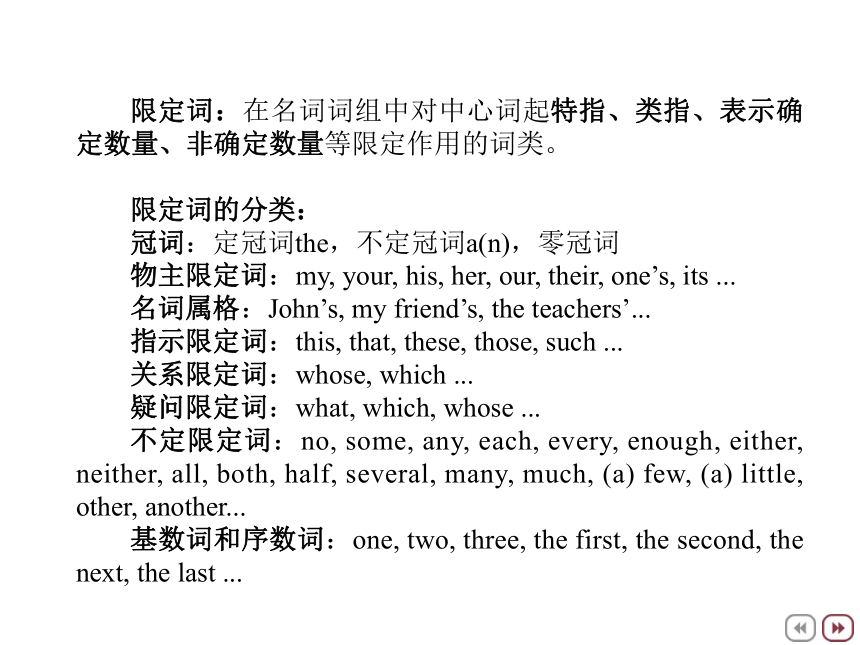 | |
| 格式 | pptx | ||
| 文件大小 | 890.3KB | ||
| 资源类型 | 教案 | ||
| 版本资源 | 新概念英语 | ||
| 科目 | 英语 | ||
| 更新时间 | 2024-11-25 18:34:19 | ||
图片预览

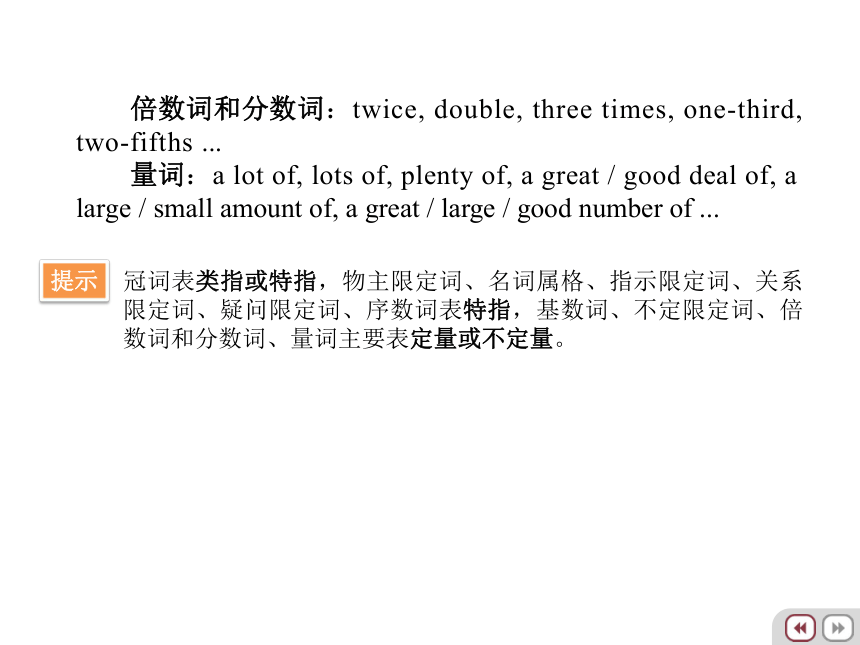
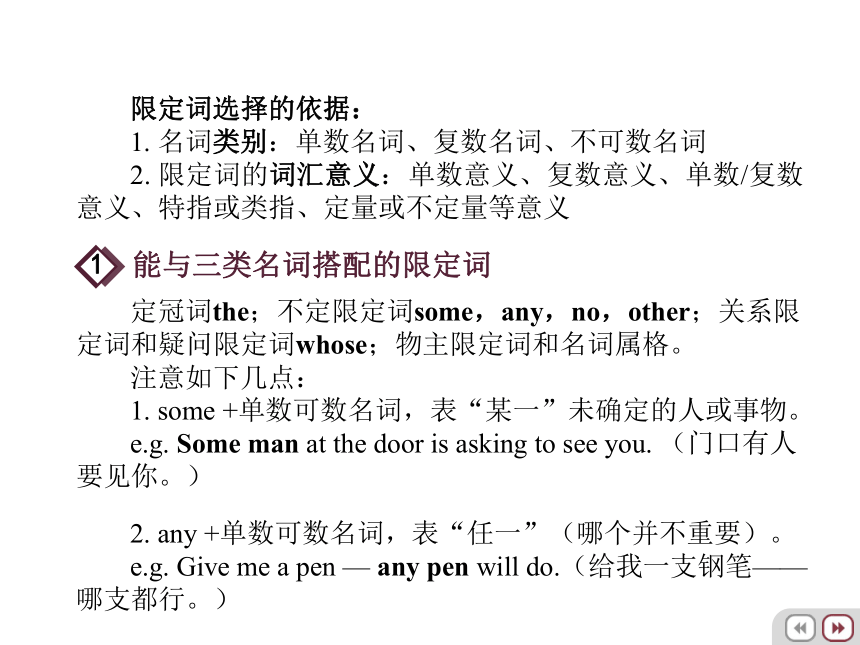
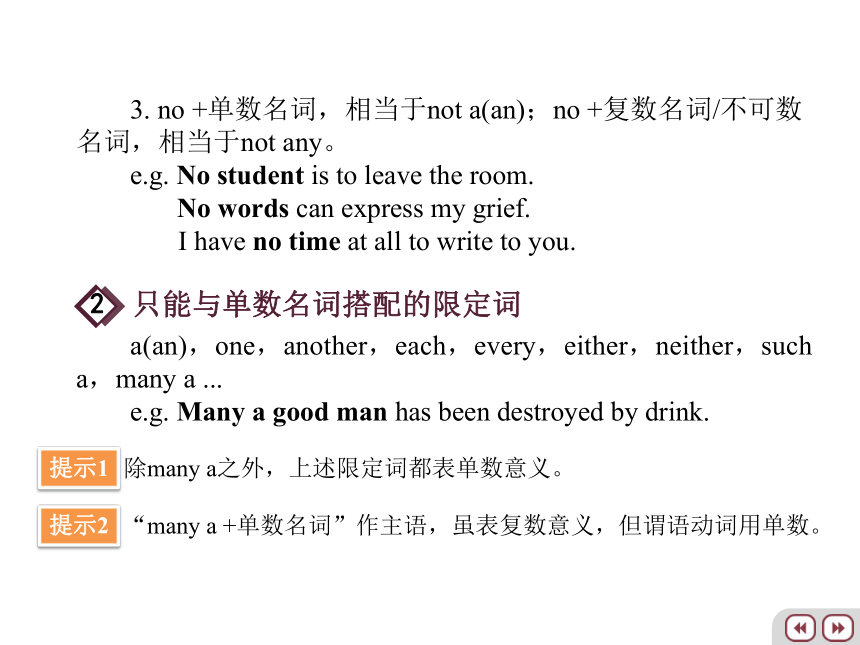
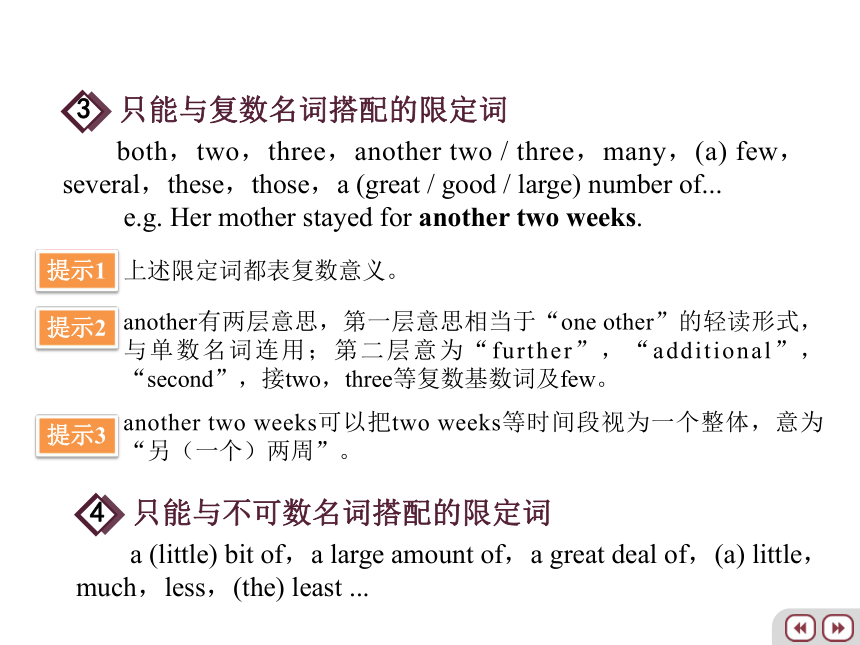
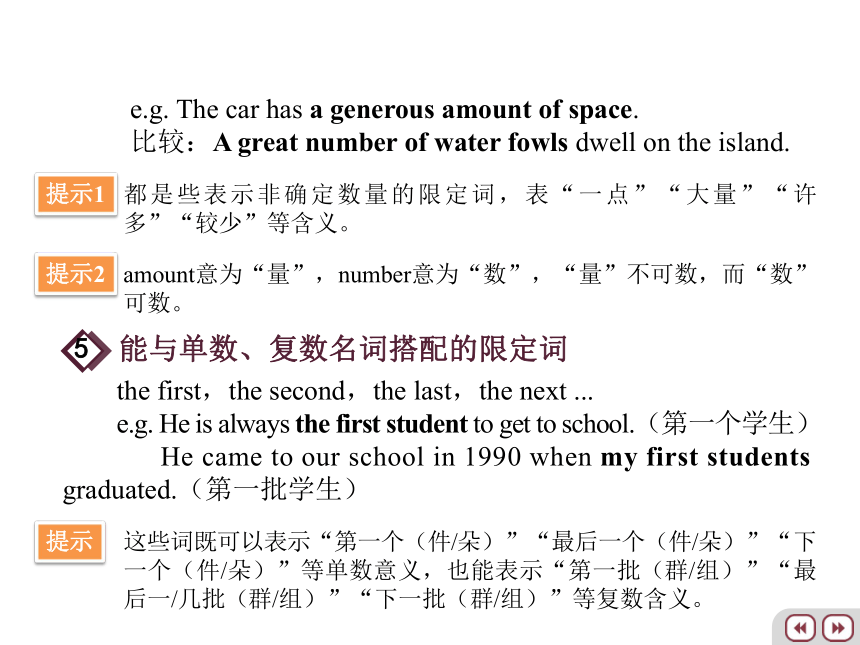
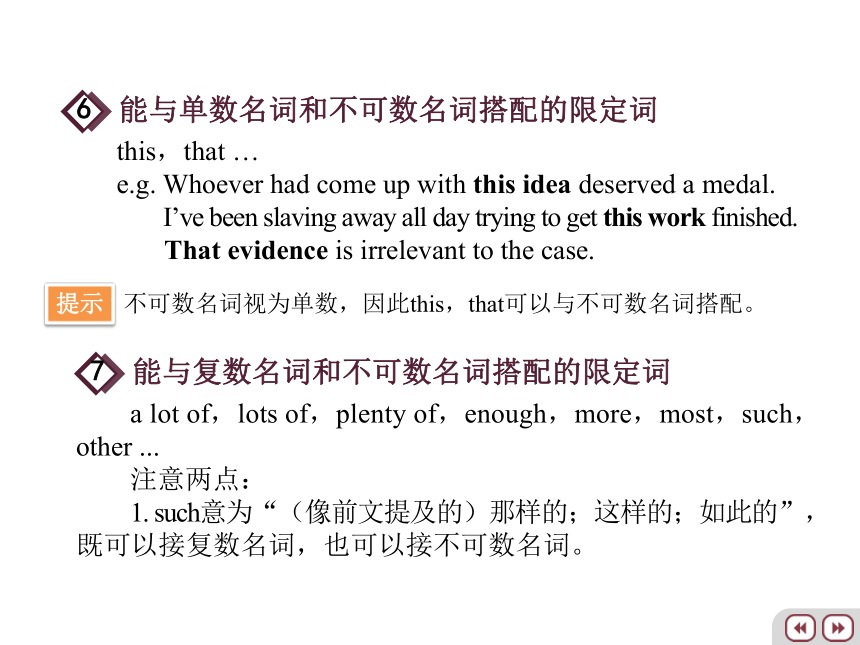

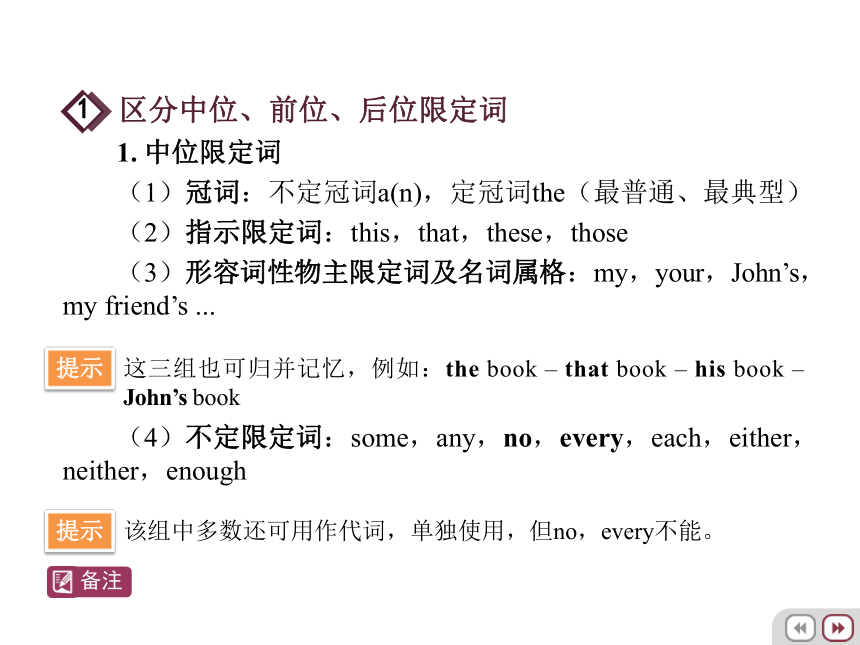
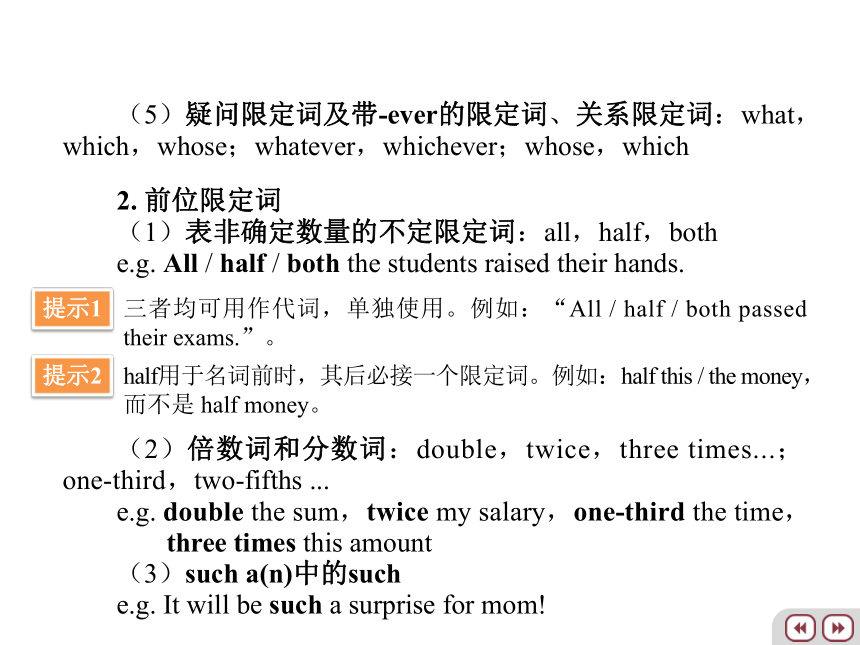
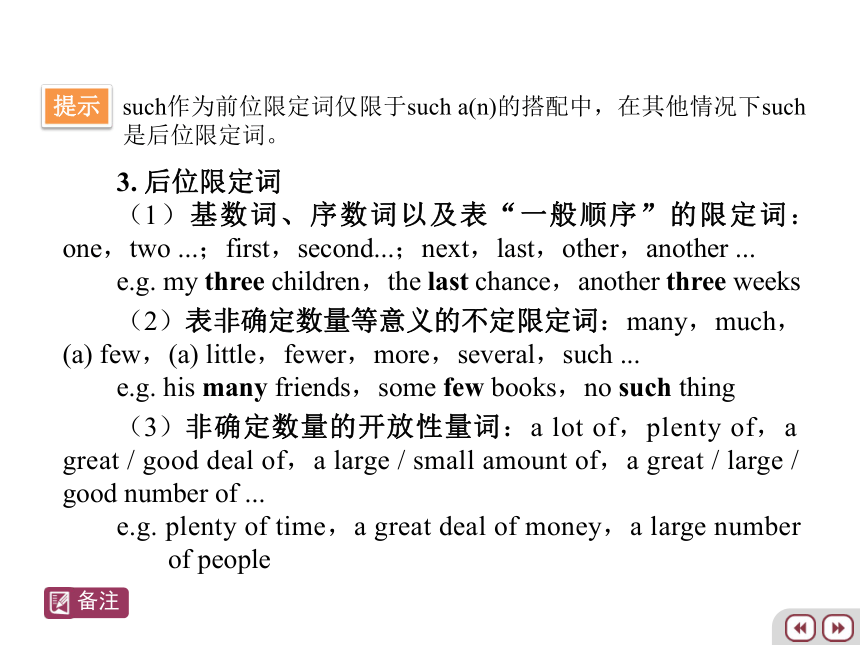
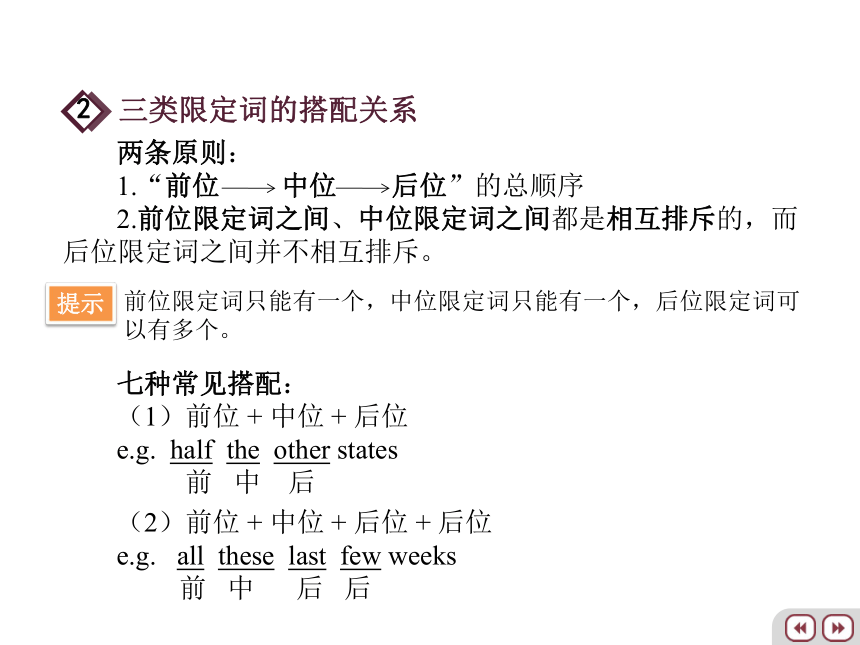
文档简介
(共42张PPT)
限定词:在名词词组中对中心词起特指、类指、表示确定数量、非确定数量等限定作用的词类。
限定词的分类:
冠词:定冠词the,不定冠词a(n),零冠词
物主限定词:my, your, his, her, our, their, one’s, its ...
名词属格:John’s, my friend’s, the teachers’...
指示限定词:this, that, these, those, such ...
关系限定词:whose, which ...
疑问限定词:what, which, whose ...
不定限定词:no, some, any, each, every, enough, either, neither, all, both, half, several, many, much, (a) few, (a) little, other, another...
基数词和序数词:one, two, three, the first, the second, the next, the last ...
冠词表类指或特指,物主限定词、名词属格、指示限定词、关系限定词、疑问限定词、序数词表特指,基数词、不定限定词、倍数词和分数词、量词主要表定量或不定量。
提示
倍数词和分数词:twice, double, three times, one-third, two-fifths ...
量词:a lot of, lots of, plenty of, a great / good deal of, a large / small amount of, a great / large / good number of ...
定冠词the;不定限定词some,any,no,other;关系限定词和疑问限定词whose;物主限定词和名词属格。
注意如下几点:
1. some +单数可数名词,表“某一”未确定的人或事物。
e.g. Some man at the door is asking to see you. (门口有人要见你。)
2. any +单数可数名词,表“任一”(哪个并不重要)。
e.g. Give me a pen — any pen will do.(给我一支钢笔——哪支都行。)
能与三类名词搭配的限定词
1
限定词选择的依据:
1. 名词类别:单数名词、复数名词、不可数名词
2. 限定词的词汇意义:单数意义、复数意义、单数/复数意义、特指或类指、定量或不定量等意义
a(an),one,another,each,every,either,neither,such a,many a ...
e.g. Many a good man has been destroyed by drink.
只能与单数名词搭配的限定词
2
3. no +单数名词,相当于not a(an);no +复数名词/不可数名词,相当于not any。
e.g. No student is to leave the room.
No words can express my grief.
I have no time at all to write to you.
除many a之外,上述限定词都表单数意义。
“many a +单数名词”作主语,虽表复数意义,但谓语动词用单数。
提示1
提示2
both,two,three,another two / three,many,(a) few,several,these,those,a (great / good / large) number of...
e.g. Her mother stayed for another two weeks.
只能与复数名词搭配的限定词
3
上述限定词都表复数意义。
another有两层意思,第一层意思相当于“one other”的轻读形式,与单数名词连用;第二层意为“further”,“additional”,“second”,接two,three等复数基数词及few。
提示1
提示2
another two weeks可以把two weeks等时间段视为一个整体,意为“另(一个)两周”。
提示3
a (little) bit of,a large amount of,a great deal of,(a) little,much,less,(the) least ...
只能与不可数名词搭配的限定词
4
the first,the second,the last,the next ...
e.g. He is always the first student to get to school.(第一个学生)
He came to our school in 1990 when my first students graduated.(第一批学生)
能与单数、复数名词搭配的限定词
5
都是些表示非确定数量的限定词,表“一点”“大量”“许多”“较少”等含义。
amount意为“量”,number意为“数”,“量”不可数,而“数”可数。
提示1
提示2
e.g. The car has a generous amount of space.
比较:A great number of water fowls dwell on the island.
这些词既可以表示“第一个(件/朵)”“最后一个(件/朵)”“下一个(件/朵)”等单数意义,也能表示“第一批(群/组)”“最后一/几批(群/组)”“下一批(群/组)”等复数含义。
提示
this,that …
e.g. Whoever had come up with this idea deserved a medal.
I’ve been slaving away all day trying to get this work finished.
That evidence is irrelevant to the case.
能与单数名词和不可数名词搭配的限定词
6
不可数名词视为单数,因此this,that可以与不可数名词搭配。
提示
a lot of,lots of,plenty of,enough,more,most,such,other ...
注意两点:
1. such意为“(像前文提及的)那样的;这样的;如此的”,既可以接复数名词,也可以接不可数名词。
能与复数名词和不可数名词搭配的限定词
7
如果算上such a,那么such可与三类名词搭配。
e.g. This isn’t the only story of starving children. Many such cases are reported every day.
He told them about the job he had left. Such information was just what they needed.
2. less,least仅在非正式语体中才可与复数名词搭配,在正式语体中需用fewer,fewest。
e.g. I guess there are much less people in the Arctic regions
than here.(非正式)
比较:In big cities, fewer and fewer people tend to hold a permanent job.(正式)
提示
1. 中位限定词
(1)冠词:不定冠词a(n),定冠词the(最普通、最典型)
(2)指示限定词:this,that,these,those
(3)形容词性物主限定词及名词属格:my,your,John’s,my friend’s ...
(4)不定限定词:some,any,no,every,each,either,neither,enough
区分中位、前位、后位限定词
1
这三组也可归并记忆,例如:the book that book his book John’s book
提示
该组中多数还可用作代词,单独使用,但no,every不能。
提示
备注
(5)疑问限定词及带-ever的限定词、关系限定词:what,which,whose;whatever,whichever;whose,which
2. 前位限定词
(1)表非确定数量的不定限定词:all,half,both
e.g. All / half / both the students raised their hands.
(2)倍数词和分数词:double,twice,three times...;one-third,two-fifths ...
e.g. double the sum,twice my salary,one-third the time,
three times this amount
(3)such a(n)中的such
e.g. It will be such a surprise for mom!
三者均可用作代词,单独使用。例如:“All / half / both passed their exams.”。
提示1
half用于名词前时,其后必接一个限定词。例如:half this / the money,而不是 half money。
提示2
3. 后位限定词
(1)基数词、序数词以及表“一般顺序”的限定词:one,two ...;first,second...;next,last,other,another ...
e.g. my three children,the last chance,another three weeks
(2)表非确定数量等意义的不定限定词:many,much,(a) few,(a) little,fewer,more,several,such ...
e.g. his many friends,some few books,no such thing
(3)非确定数量的开放性量词:a lot of,plenty of,a great / good deal of,a large / small amount of,a great / large / good number of ...
e.g. plenty of time,a great deal of money,a large number
of people
such作为前位限定词仅限于such a(n)的搭配中,在其他情况下such是后位限定词。
提示
备注
三类限定词的搭配关系
2
两条原则:
1.“前位 中位 后位”的总顺序
2.前位限定词之间、中位限定词之间都是相互排斥的,而后位限定词之间并不相互排斥。
七种常见搭配:
(1)前位 + 中位 + 后位
e.g. half the other states
前 中 后
(2)前位 + 中位 + 后位 + 后位
e.g. all these last few weeks
前 中 后 后
前位限定词只能有一个,中位限定词只能有一个,后位限定词可以有多个。
提示
(3)前位 + 中位
e.g. both his children
前 中
(4)前位 + 后位
e.g. all other factors
前 后
(5)中位 + 后位
e.g. his many achievements
中 后
(6)中位 + 后位 + 后位
e.g. the next two decades
中 后 后
(7)后位 + 后位
e.g. one such place
后 后
个别限定词的跨类现象
3
1. such 在such a(n)中是前位,其他搭配中是后位
e.g. such a small amount,such an opportunity;
some such excuse,any such claim,no such thing,few such demands,one such problem
2. every通常属中位;名词属格/物主限定词+ every结构中,every属后位
e.g. I try to visit my parents every few weeks.(中位)
His every utterance will be scrutinized.(后位)
such a(n)搭配中such为强化语,其他搭配中such为非强化语。
也可把what视为跨类的限定词,在what a(n)中视为前位限定词,如what a surprise,在其他搭配中是中位限定词。
提示1
提示2
也可把many视为跨类的限定词,在many a(n)中视为前位限定词,如many a child,在其他搭配中是后位限定词。
提示3
典型错误
* There is no such a thing as a free lunch.
√ There is no such thing as a free lunch.
在no such结构中such是后位限定词,其后不能再加中位限定词a。
句中many为后位限定词,his为中位限定词,正确顺序为his many +名词。
提示
提示
*He held a number of patents for many his innovations.
√ He held a number of patents for his many innovations.
Which of the following is INCORRECT
A.
B.
C.
D.
A bit of flowers
Few words
This work
Another two girls
本题考查限定词和名词的搭配关系。A项中的a bit of只能与不可数名词搭配,而flowers为复数名词,因此A为答案;B项中的few只能与复数名词搭配;C项中的this既可与单数名词,也可与不可数名词搭配;D项中的another既可修饰单数名词,也可与表复数意义的基数词连用,后接复数名词,表“额外”的意思,如another three weeks。
下面哪一个不正确?
The following determiners (限定词) can be used with both plural and uncountable nouns EXCEPT ______.
A.
B.
C.
D.
many
enough
more
such
该题考查限定词和名词的搭配关系。限定词many只能修饰复数名词,不能修饰不可数名词,因此,A为正确答案。more,enough和such这三个限定词既可以和复数名词连用,又可以和不可数名词连用,如more books,more paper;enough rooms,enough space;such men,such character。
下列限定词中哪个词不是既能与复数名词连用,又能和不可数名词连用?
Which of the following determiners (限定词) can be placed before both singular count nouns and plural count nouns
A.
B.
C.
D.
many a
few
such
the next
该题考查限定词和名词的搭配关系。有些“一般顺序”的后位限定词如the last,the next等既可与单数名词搭配,也可与复数名词搭配,the next意为“下一个;下一批”等,因此D为正确答案。many a只能与单数名词搭配,few只能与复数名词搭配,such可以与复数名词搭配,也可以与不可数名词搭配,如such noises,such water。
下列限定词哪个既可置于单数名词前又可置于复数名词前?
Which of the following italicized phrases is INCORRECT
A.
B.
C.
D.
The city is now ten times its original size.
I wish I had two times his strength.
The seller asked for double the usual price.
They come here four times every year.
该题考查倍数词的表示方法及三类限定词之间的搭配关系。在同一名词词组中三类限定词总是按照“前位 中位 后位”的顺序排列,ten times,double都是前位限定词,its,his,the都是中位限定词,A、B、C中的限定词顺序没有错,但是英语中表示两倍用twice或double,不用two times,因此B为答案。D项是关于状语的排列顺序,four times every year符合“频度状语 ‘何时’时间状语”的通常顺序,因此也正确。
下列哪个句子中的斜体部分是错误的?
The additional work will take ______ weeks.
A.
B.
C.
D.
the other
another two
other two
the more
该题考查限定词的辨析。other表示“(两者中的)另一个;另外那(几)个”,常见搭配为one…the other,the other + 复数名词(意为“其他的人或事物”);another通常与单数名词连用,意思相当于“one other”的轻读形式,此外,another意为“further”,“additional”,“second”,可以接few及two,three等表复数意义的基数词,因此能与复数名词搭配。根据句意可知,额外的工作还要“再花两周”,因此B为正确答案。A项the other weeks虽然可以搭配,但与句意不符;C项other后不能跟数词;D项the more weeks与take搭配不合句意,more能用于数词后,可以说two more weeks。该题与《教程》P71 Ex.8C-1类似。
这项额外的工作还要再花两周的时间。
Which of the following sentences is INCORRECT
A.
B.
C.
D.
All his lectures are very interesting.
Half their savings were gone.
Many his friends came to the party.
Both his sisters are nurses.
该题考查限定词之间的搭配关系。限定词之间的搭配顺序为:“前位 中位 后位”。All,half,both均为前位限定词,his,their为中位限定词,many为后位限定词。A项中的All his为“前位+中位”;B项中的Half their为“前位+中位”;D项中的Both his为“前位+中位”,顺序均正确。只有C项的排列顺序为“后位+中位”,不符合限定词之间的搭配顺序,因此选C。C项正确顺序为“His many friends came to the party.”,该项与《教程》P71Ex.8C-6类似。
下列哪句话不正确?
A new laptop costs about _____ of a second-hand one.
A.
B.
C.
D.
the price of three times
three times the price
as much as the three times price
three times more than the price
该题考查倍数的表达方式及限定词之间的搭配关系。英语中表达倍数关系有多种方式,如下三种较为常见:a.倍数(或分数)+ as + adj. + as; b.倍数(或分数)+ the size (amount, length...) of...;c.倍数(或分数)+形容词(副词)比较级 + than …。本句是第二种表示倍数关系的用法,多少倍后不加任何代词或介词,three times the为“前位+中位”的排列顺序,因此B为正确答案。该句与《教程》P74 第四个例句类似。表示倍数的词应置于前面,所以A、C项均错。D项填入后more为代词作cost的宾语,than引导比较分句修饰more。比较分句的逻辑主语应该和句子主语保持一致,因此than后的主语应该是a second-hand one,而不是the price of a second-hand one,故不选。
一台新笔记本的价格是一台二手笔记本的三倍。
Land belongs to the city; there is ______ thing as private ownership of land.
A.
B.
C.
D.
no such a
not such
not such a
no such
该题考查限定词such及no的用法。such属于跨类限定词,在such a(n)结构中such为前位限定词,而在与其他限定词(one,no,any,some,all,many等)搭配时,such则是后位限定词。no为中位限定词,no such thing as为惯用语,意为“没…这回事儿/没…这个概念”,此时,其后不能再加冠词,因此D为正确答案。not such a后需先接其他修饰词才能再接名词,如not such a good painting。该题与《教程》P72 Ex.8C-18类似。
土地是属于城市的;没有土地私有权这回事儿。
They fulfilled the task in ______ it took us.
A.
B.
C.
D.
three-fourths time
three-fourths times
three-fourths the time
the three-fourths time
该题考查限定词之间的搭配关系及限制性关系分句。限定词之间的搭配顺序为:“前位 中位 后位”。three-fourths为前位限定词,the为中位限定词,D项顺序不对。it took us为省略关系代词that的限制性关系分句,基本句型为it took sb. some time to do sth.,其先行词time前需有定冠词,因此C为正确答案。该题与《教程》P71 EX. 8C-2类似。
他们用了我们所用时间的3/4就完成了这项任务。
本讲主要介绍了限定词的概念及分类,限定词与三类名词的搭配关系,中位、前位、后位限定词的划分,限定词之间的搭配关系,以及限定词的表意功能。限定词的概念和分类部分建议和限定词的表意功能一起学习,理解了限定词的四种表意功能就理解了限定词的概念,方便限定词分类的学习和记忆。
限定词的两种搭配关系是本讲的重点。限定词与名词的搭配关系中,限定词的选择与名词的类别密切相关,还要考虑限定词的词汇意义,是单数名词、复数名词,还是不可数名词,限定词表达单数意义、复数意义,还是特指或类指等意义。三类限定词之间的搭配关系需要在区分前、中、后位限定词的基础上,把握“前位 中位 后位”的总顺序,以及“前位限定词之间、中位限定词之间都是相互排斥的,而后位限定词之间并不相互排斥”这两条基本搭配原则,最后注意个别限定词的跨类现象。
Why is there ________ traffic on the streets in February than in May?
A.
B.
C.
D.
On account of the typhoon ________ shipment will arrive this week.
A.
B.
C.
D.
less
fewer
few
little
neither
all
both
these
Have you got ________ copies to go round?
A.
B.
C.
D.
________ work has to be done before the plant goes into operation.
A.
B.
C.
D.
the other
enough
a little
much
Much
Double
A number of
Neither
He wrote ________ essays on Victorian novels in his class.
A.
B.
C.
D.
The model worker had ________ thought of his own interests.
A.
B.
C.
D.
the next
the most
the other
the more
the last
less
the least
another
There must be ________ empty talk but more hard work.
A.
B.
C.
D.
He has published ________ short stories in English.
A.
B.
C.
D.
fewer
no
the least
less
a great amount of
a number of
another
many a
________ care would have prevented the accident.
A.
B.
C.
D.
The students spent ________ their time working in the fields.
A.
B.
C.
D.
Much
Little
A little
A few
both
most
more
half
1.
2.
3.
4.
5.
6.
Janet couldn’t find any ________ on child care in the bookstore.
There is a stairway at either ________ of the corridor.
We don’t have much ________ of him.
This question is too difficult even for one who has double our ___________.
Write your answer on every other ________.
I wish I had twice his ________ so that I could lift that heavy weight.
books
end
news
intelligence
line
strength
7.
8.
9.
10.
Every such ________ of corruption will be prosecuted.
The first ten ________ have arrived; the rest are yet to be shipped.
We need another two ________ for the accommodation of the new-comers.
Few such ________ have been found in that district.
case
bales
rooms
cases
The additional work will take ________ weeks.
A.
B.
C.
D.
He did it in ________ time it took me.
A.
B.
C.
D.
the other
another five
other five
the more
the one-third
half a
the double
one-third the
________ friends usually speak highly of him.
A.
B.
C.
D.
________ alloy may be used to replace copper.
A.
B.
C.
D.
His some
His many
Many his
Some his
Such a
Some such
Such some
Several such
Are you going to buy ________ rice?
A.
B.
C.
D.
________ dictionary is enough for me.
A.
B.
C.
D.
all these
these all
all this
both these
Such one
One such
Such a one
One such a
________ cases have been reported.
A.
B.
C.
D.
________ recommendation has so far been made by the technicians.
A.
B.
C.
D.
Such few
Such some
Few such
Some these
Several such
No such a
Such no
No such
He has been staying at home ________ days.
A.
B.
C.
D.
these all last few
these last few all
all these last few
these last all few
1.
2.
3.
4.
5.
We have got enough time to read such many novels.
He has much more problems than he used to.
I enjoy both kind, the red wine or the white wine.
The librarian has catalogued each book in the fiction section.
More corn is produced in the United States than in any country in the world.
many such novels
many more problems
either kind
every
any other country
6.
7.
8.
9.
10.
The farmers are hoping that there will be a great many rainfall this year than there was last year.
The customs officer examined all these luggage at the airport.
Any nonsense he talked, he fondly hoped we would believe it.
He came to see me once three months.
Would you like any more soup
a greater amount of rainfall
all this luggage
Whatever nonsense
once every three months
some more soup
Of the all things we eat and drink, the water is the most important. No many people understand this, but it is quite true. A human body can go without the food for a long time, but two or three days without water will result in death.
Of all the things we eat and drink, water is the most important. Not many people understand this, but it is quite true. The human body can go without food for a long time, but two or three days without water will result in death.
正式语体中通常用定冠词表类指,表达“人体”通常用the human body。
food为不可数名词,常用零冠词表类指。
the all
No many
the food
the water
water为不可数名词,常用零冠词表类指。
限定词no意为“not one / not any”,其后不能再接表数量的限定词,表达“不是(很多人)”可用否定副词not表达。
介词词组of the all things中名词things前面限定词的排列顺序不对,应该按照“前(all)+中(the)”的顺序排列。
A human body
Quite few people do not understand how much water the human body needs to work properly, and some few people do not drink enough. More people drink when they are thirsty but often need much more. Especially when they have been taking exercises.
Many people do not understand how much water the human body needs to work properly, and many people do not drink enough. More people drink when they are thirsty, but often need more water, especially when they have been taking exercises.
Quite few
much more
some few
but
Especially
but连接的并列分句之前通常用逗号分隔,参见《教程》P479。
表达“许多”用many或quite a few。
这里more应指代more water,最好用more water明确其指代对象。
强调副词especially与被修饰成分之间通常用逗号分隔,不用句号。
虽然some few可以与people搭配,意为“少数人”,但是根据上下文,这里表达“很多人没有喝足够量的水”,才合乎逻辑,应该用many people。
It is vital that people should drink enough water every day. Water can help people to keep fit. It can also ease pain in a case of illness. The habit of drinking water soon after getting up will bring the purging and refreshing effect; likewise, drinking some water before the bedtime will also do people, especially old people, a lot of good. When one is fainting, water will bring him back to a consciousness; if one is badly wounded, water will help to lend him vigour. In a word, water means the life. A lack of water in body is most harmful to your health.
It is vital that people should drink enough water every day. Water can help people to keep fit. It can also ease pain in case of illness. The habit of drinking water soon after getting up will bring a purging and refreshing effect; likewise, drinking some water before bedtime will also do people, especially old people, a lot of good. When one is fainting, water will bring him back to consciousness; if one is badly wounded, water will help to lend him vigour. In a word, water means life. A lack of water in the body is most harmful to your health.
the
the bedtime
a consciousness
body
the life
in a case of
通常没有in a case of 的用法;in the case of意为“在…的情况下”;表达“生病时”要用in case of illness,in case of意为“万一;如果发生”。
consciousness为不可数名词,不能用不定冠词a限定,搭配bring sb. back to consciousness意为“使某人恢复意识”。
句中life(生命)为不可数名词,用零冠词表类指,不用定冠词the。
body(身体)为可数名词,在正式语体中多用定冠词the表类指。该句意为“身体中缺水最有害于身体健康”。
名词effect作为“效果;作用”意时为可数名词,搭配bring a purging and refreshing effect意为“带来一种净化和提神的效果”,effect前面需要用不定冠词a(n)。
bedtime为不可数名词,用零冠词表类指,搭配before bedtime意为“睡前”。
限定词:在名词词组中对中心词起特指、类指、表示确定数量、非确定数量等限定作用的词类。
限定词的分类:
冠词:定冠词the,不定冠词a(n),零冠词
物主限定词:my, your, his, her, our, their, one’s, its ...
名词属格:John’s, my friend’s, the teachers’...
指示限定词:this, that, these, those, such ...
关系限定词:whose, which ...
疑问限定词:what, which, whose ...
不定限定词:no, some, any, each, every, enough, either, neither, all, both, half, several, many, much, (a) few, (a) little, other, another...
基数词和序数词:one, two, three, the first, the second, the next, the last ...
冠词表类指或特指,物主限定词、名词属格、指示限定词、关系限定词、疑问限定词、序数词表特指,基数词、不定限定词、倍数词和分数词、量词主要表定量或不定量。
提示
倍数词和分数词:twice, double, three times, one-third, two-fifths ...
量词:a lot of, lots of, plenty of, a great / good deal of, a large / small amount of, a great / large / good number of ...
定冠词the;不定限定词some,any,no,other;关系限定词和疑问限定词whose;物主限定词和名词属格。
注意如下几点:
1. some +单数可数名词,表“某一”未确定的人或事物。
e.g. Some man at the door is asking to see you. (门口有人要见你。)
2. any +单数可数名词,表“任一”(哪个并不重要)。
e.g. Give me a pen — any pen will do.(给我一支钢笔——哪支都行。)
能与三类名词搭配的限定词
1
限定词选择的依据:
1. 名词类别:单数名词、复数名词、不可数名词
2. 限定词的词汇意义:单数意义、复数意义、单数/复数意义、特指或类指、定量或不定量等意义
a(an),one,another,each,every,either,neither,such a,many a ...
e.g. Many a good man has been destroyed by drink.
只能与单数名词搭配的限定词
2
3. no +单数名词,相当于not a(an);no +复数名词/不可数名词,相当于not any。
e.g. No student is to leave the room.
No words can express my grief.
I have no time at all to write to you.
除many a之外,上述限定词都表单数意义。
“many a +单数名词”作主语,虽表复数意义,但谓语动词用单数。
提示1
提示2
both,two,three,another two / three,many,(a) few,several,these,those,a (great / good / large) number of...
e.g. Her mother stayed for another two weeks.
只能与复数名词搭配的限定词
3
上述限定词都表复数意义。
another有两层意思,第一层意思相当于“one other”的轻读形式,与单数名词连用;第二层意为“further”,“additional”,“second”,接two,three等复数基数词及few。
提示1
提示2
another two weeks可以把two weeks等时间段视为一个整体,意为“另(一个)两周”。
提示3
a (little) bit of,a large amount of,a great deal of,(a) little,much,less,(the) least ...
只能与不可数名词搭配的限定词
4
the first,the second,the last,the next ...
e.g. He is always the first student to get to school.(第一个学生)
He came to our school in 1990 when my first students graduated.(第一批学生)
能与单数、复数名词搭配的限定词
5
都是些表示非确定数量的限定词,表“一点”“大量”“许多”“较少”等含义。
amount意为“量”,number意为“数”,“量”不可数,而“数”可数。
提示1
提示2
e.g. The car has a generous amount of space.
比较:A great number of water fowls dwell on the island.
这些词既可以表示“第一个(件/朵)”“最后一个(件/朵)”“下一个(件/朵)”等单数意义,也能表示“第一批(群/组)”“最后一/几批(群/组)”“下一批(群/组)”等复数含义。
提示
this,that …
e.g. Whoever had come up with this idea deserved a medal.
I’ve been slaving away all day trying to get this work finished.
That evidence is irrelevant to the case.
能与单数名词和不可数名词搭配的限定词
6
不可数名词视为单数,因此this,that可以与不可数名词搭配。
提示
a lot of,lots of,plenty of,enough,more,most,such,other ...
注意两点:
1. such意为“(像前文提及的)那样的;这样的;如此的”,既可以接复数名词,也可以接不可数名词。
能与复数名词和不可数名词搭配的限定词
7
如果算上such a,那么such可与三类名词搭配。
e.g. This isn’t the only story of starving children. Many such cases are reported every day.
He told them about the job he had left. Such information was just what they needed.
2. less,least仅在非正式语体中才可与复数名词搭配,在正式语体中需用fewer,fewest。
e.g. I guess there are much less people in the Arctic regions
than here.(非正式)
比较:In big cities, fewer and fewer people tend to hold a permanent job.(正式)
提示
1. 中位限定词
(1)冠词:不定冠词a(n),定冠词the(最普通、最典型)
(2)指示限定词:this,that,these,those
(3)形容词性物主限定词及名词属格:my,your,John’s,my friend’s ...
(4)不定限定词:some,any,no,every,each,either,neither,enough
区分中位、前位、后位限定词
1
这三组也可归并记忆,例如:the book that book his book John’s book
提示
该组中多数还可用作代词,单独使用,但no,every不能。
提示
备注
(5)疑问限定词及带-ever的限定词、关系限定词:what,which,whose;whatever,whichever;whose,which
2. 前位限定词
(1)表非确定数量的不定限定词:all,half,both
e.g. All / half / both the students raised their hands.
(2)倍数词和分数词:double,twice,three times...;one-third,two-fifths ...
e.g. double the sum,twice my salary,one-third the time,
three times this amount
(3)such a(n)中的such
e.g. It will be such a surprise for mom!
三者均可用作代词,单独使用。例如:“All / half / both passed their exams.”。
提示1
half用于名词前时,其后必接一个限定词。例如:half this / the money,而不是 half money。
提示2
3. 后位限定词
(1)基数词、序数词以及表“一般顺序”的限定词:one,two ...;first,second...;next,last,other,another ...
e.g. my three children,the last chance,another three weeks
(2)表非确定数量等意义的不定限定词:many,much,(a) few,(a) little,fewer,more,several,such ...
e.g. his many friends,some few books,no such thing
(3)非确定数量的开放性量词:a lot of,plenty of,a great / good deal of,a large / small amount of,a great / large / good number of ...
e.g. plenty of time,a great deal of money,a large number
of people
such作为前位限定词仅限于such a(n)的搭配中,在其他情况下such是后位限定词。
提示
备注
三类限定词的搭配关系
2
两条原则:
1.“前位 中位 后位”的总顺序
2.前位限定词之间、中位限定词之间都是相互排斥的,而后位限定词之间并不相互排斥。
七种常见搭配:
(1)前位 + 中位 + 后位
e.g. half the other states
前 中 后
(2)前位 + 中位 + 后位 + 后位
e.g. all these last few weeks
前 中 后 后
前位限定词只能有一个,中位限定词只能有一个,后位限定词可以有多个。
提示
(3)前位 + 中位
e.g. both his children
前 中
(4)前位 + 后位
e.g. all other factors
前 后
(5)中位 + 后位
e.g. his many achievements
中 后
(6)中位 + 后位 + 后位
e.g. the next two decades
中 后 后
(7)后位 + 后位
e.g. one such place
后 后
个别限定词的跨类现象
3
1. such 在such a(n)中是前位,其他搭配中是后位
e.g. such a small amount,such an opportunity;
some such excuse,any such claim,no such thing,few such demands,one such problem
2. every通常属中位;名词属格/物主限定词+ every结构中,every属后位
e.g. I try to visit my parents every few weeks.(中位)
His every utterance will be scrutinized.(后位)
such a(n)搭配中such为强化语,其他搭配中such为非强化语。
也可把what视为跨类的限定词,在what a(n)中视为前位限定词,如what a surprise,在其他搭配中是中位限定词。
提示1
提示2
也可把many视为跨类的限定词,在many a(n)中视为前位限定词,如many a child,在其他搭配中是后位限定词。
提示3
典型错误
* There is no such a thing as a free lunch.
√ There is no such thing as a free lunch.
在no such结构中such是后位限定词,其后不能再加中位限定词a。
句中many为后位限定词,his为中位限定词,正确顺序为his many +名词。
提示
提示
*He held a number of patents for many his innovations.
√ He held a number of patents for his many innovations.
Which of the following is INCORRECT
A.
B.
C.
D.
A bit of flowers
Few words
This work
Another two girls
本题考查限定词和名词的搭配关系。A项中的a bit of只能与不可数名词搭配,而flowers为复数名词,因此A为答案;B项中的few只能与复数名词搭配;C项中的this既可与单数名词,也可与不可数名词搭配;D项中的another既可修饰单数名词,也可与表复数意义的基数词连用,后接复数名词,表“额外”的意思,如another three weeks。
下面哪一个不正确?
The following determiners (限定词) can be used with both plural and uncountable nouns EXCEPT ______.
A.
B.
C.
D.
many
enough
more
such
该题考查限定词和名词的搭配关系。限定词many只能修饰复数名词,不能修饰不可数名词,因此,A为正确答案。more,enough和such这三个限定词既可以和复数名词连用,又可以和不可数名词连用,如more books,more paper;enough rooms,enough space;such men,such character。
下列限定词中哪个词不是既能与复数名词连用,又能和不可数名词连用?
Which of the following determiners (限定词) can be placed before both singular count nouns and plural count nouns
A.
B.
C.
D.
many a
few
such
the next
该题考查限定词和名词的搭配关系。有些“一般顺序”的后位限定词如the last,the next等既可与单数名词搭配,也可与复数名词搭配,the next意为“下一个;下一批”等,因此D为正确答案。many a只能与单数名词搭配,few只能与复数名词搭配,such可以与复数名词搭配,也可以与不可数名词搭配,如such noises,such water。
下列限定词哪个既可置于单数名词前又可置于复数名词前?
Which of the following italicized phrases is INCORRECT
A.
B.
C.
D.
The city is now ten times its original size.
I wish I had two times his strength.
The seller asked for double the usual price.
They come here four times every year.
该题考查倍数词的表示方法及三类限定词之间的搭配关系。在同一名词词组中三类限定词总是按照“前位 中位 后位”的顺序排列,ten times,double都是前位限定词,its,his,the都是中位限定词,A、B、C中的限定词顺序没有错,但是英语中表示两倍用twice或double,不用two times,因此B为答案。D项是关于状语的排列顺序,four times every year符合“频度状语 ‘何时’时间状语”的通常顺序,因此也正确。
下列哪个句子中的斜体部分是错误的?
The additional work will take ______ weeks.
A.
B.
C.
D.
the other
another two
other two
the more
该题考查限定词的辨析。other表示“(两者中的)另一个;另外那(几)个”,常见搭配为one…the other,the other + 复数名词(意为“其他的人或事物”);another通常与单数名词连用,意思相当于“one other”的轻读形式,此外,another意为“further”,“additional”,“second”,可以接few及two,three等表复数意义的基数词,因此能与复数名词搭配。根据句意可知,额外的工作还要“再花两周”,因此B为正确答案。A项the other weeks虽然可以搭配,但与句意不符;C项other后不能跟数词;D项the more weeks与take搭配不合句意,more能用于数词后,可以说two more weeks。该题与《教程》P71 Ex.8C-1类似。
这项额外的工作还要再花两周的时间。
Which of the following sentences is INCORRECT
A.
B.
C.
D.
All his lectures are very interesting.
Half their savings were gone.
Many his friends came to the party.
Both his sisters are nurses.
该题考查限定词之间的搭配关系。限定词之间的搭配顺序为:“前位 中位 后位”。All,half,both均为前位限定词,his,their为中位限定词,many为后位限定词。A项中的All his为“前位+中位”;B项中的Half their为“前位+中位”;D项中的Both his为“前位+中位”,顺序均正确。只有C项的排列顺序为“后位+中位”,不符合限定词之间的搭配顺序,因此选C。C项正确顺序为“His many friends came to the party.”,该项与《教程》P71Ex.8C-6类似。
下列哪句话不正确?
A new laptop costs about _____ of a second-hand one.
A.
B.
C.
D.
the price of three times
three times the price
as much as the three times price
three times more than the price
该题考查倍数的表达方式及限定词之间的搭配关系。英语中表达倍数关系有多种方式,如下三种较为常见:a.倍数(或分数)+ as + adj. + as; b.倍数(或分数)+ the size (amount, length...) of...;c.倍数(或分数)+形容词(副词)比较级 + than …。本句是第二种表示倍数关系的用法,多少倍后不加任何代词或介词,three times the为“前位+中位”的排列顺序,因此B为正确答案。该句与《教程》P74 第四个例句类似。表示倍数的词应置于前面,所以A、C项均错。D项填入后more为代词作cost的宾语,than引导比较分句修饰more。比较分句的逻辑主语应该和句子主语保持一致,因此than后的主语应该是a second-hand one,而不是the price of a second-hand one,故不选。
一台新笔记本的价格是一台二手笔记本的三倍。
Land belongs to the city; there is ______ thing as private ownership of land.
A.
B.
C.
D.
no such a
not such
not such a
no such
该题考查限定词such及no的用法。such属于跨类限定词,在such a(n)结构中such为前位限定词,而在与其他限定词(one,no,any,some,all,many等)搭配时,such则是后位限定词。no为中位限定词,no such thing as为惯用语,意为“没…这回事儿/没…这个概念”,此时,其后不能再加冠词,因此D为正确答案。not such a后需先接其他修饰词才能再接名词,如not such a good painting。该题与《教程》P72 Ex.8C-18类似。
土地是属于城市的;没有土地私有权这回事儿。
They fulfilled the task in ______ it took us.
A.
B.
C.
D.
three-fourths time
three-fourths times
three-fourths the time
the three-fourths time
该题考查限定词之间的搭配关系及限制性关系分句。限定词之间的搭配顺序为:“前位 中位 后位”。three-fourths为前位限定词,the为中位限定词,D项顺序不对。it took us为省略关系代词that的限制性关系分句,基本句型为it took sb. some time to do sth.,其先行词time前需有定冠词,因此C为正确答案。该题与《教程》P71 EX. 8C-2类似。
他们用了我们所用时间的3/4就完成了这项任务。
本讲主要介绍了限定词的概念及分类,限定词与三类名词的搭配关系,中位、前位、后位限定词的划分,限定词之间的搭配关系,以及限定词的表意功能。限定词的概念和分类部分建议和限定词的表意功能一起学习,理解了限定词的四种表意功能就理解了限定词的概念,方便限定词分类的学习和记忆。
限定词的两种搭配关系是本讲的重点。限定词与名词的搭配关系中,限定词的选择与名词的类别密切相关,还要考虑限定词的词汇意义,是单数名词、复数名词,还是不可数名词,限定词表达单数意义、复数意义,还是特指或类指等意义。三类限定词之间的搭配关系需要在区分前、中、后位限定词的基础上,把握“前位 中位 后位”的总顺序,以及“前位限定词之间、中位限定词之间都是相互排斥的,而后位限定词之间并不相互排斥”这两条基本搭配原则,最后注意个别限定词的跨类现象。
Why is there ________ traffic on the streets in February than in May?
A.
B.
C.
D.
On account of the typhoon ________ shipment will arrive this week.
A.
B.
C.
D.
less
fewer
few
little
neither
all
both
these
Have you got ________ copies to go round?
A.
B.
C.
D.
________ work has to be done before the plant goes into operation.
A.
B.
C.
D.
the other
enough
a little
much
Much
Double
A number of
Neither
He wrote ________ essays on Victorian novels in his class.
A.
B.
C.
D.
The model worker had ________ thought of his own interests.
A.
B.
C.
D.
the next
the most
the other
the more
the last
less
the least
another
There must be ________ empty talk but more hard work.
A.
B.
C.
D.
He has published ________ short stories in English.
A.
B.
C.
D.
fewer
no
the least
less
a great amount of
a number of
another
many a
________ care would have prevented the accident.
A.
B.
C.
D.
The students spent ________ their time working in the fields.
A.
B.
C.
D.
Much
Little
A little
A few
both
most
more
half
1.
2.
3.
4.
5.
6.
Janet couldn’t find any ________ on child care in the bookstore.
There is a stairway at either ________ of the corridor.
We don’t have much ________ of him.
This question is too difficult even for one who has double our ___________.
Write your answer on every other ________.
I wish I had twice his ________ so that I could lift that heavy weight.
books
end
news
intelligence
line
strength
7.
8.
9.
10.
Every such ________ of corruption will be prosecuted.
The first ten ________ have arrived; the rest are yet to be shipped.
We need another two ________ for the accommodation of the new-comers.
Few such ________ have been found in that district.
case
bales
rooms
cases
The additional work will take ________ weeks.
A.
B.
C.
D.
He did it in ________ time it took me.
A.
B.
C.
D.
the other
another five
other five
the more
the one-third
half a
the double
one-third the
________ friends usually speak highly of him.
A.
B.
C.
D.
________ alloy may be used to replace copper.
A.
B.
C.
D.
His some
His many
Many his
Some his
Such a
Some such
Such some
Several such
Are you going to buy ________ rice?
A.
B.
C.
D.
________ dictionary is enough for me.
A.
B.
C.
D.
all these
these all
all this
both these
Such one
One such
Such a one
One such a
________ cases have been reported.
A.
B.
C.
D.
________ recommendation has so far been made by the technicians.
A.
B.
C.
D.
Such few
Such some
Few such
Some these
Several such
No such a
Such no
No such
He has been staying at home ________ days.
A.
B.
C.
D.
these all last few
these last few all
all these last few
these last all few
1.
2.
3.
4.
5.
We have got enough time to read such many novels.
He has much more problems than he used to.
I enjoy both kind, the red wine or the white wine.
The librarian has catalogued each book in the fiction section.
More corn is produced in the United States than in any country in the world.
many such novels
many more problems
either kind
every
any other country
6.
7.
8.
9.
10.
The farmers are hoping that there will be a great many rainfall this year than there was last year.
The customs officer examined all these luggage at the airport.
Any nonsense he talked, he fondly hoped we would believe it.
He came to see me once three months.
Would you like any more soup
a greater amount of rainfall
all this luggage
Whatever nonsense
once every three months
some more soup
Of the all things we eat and drink, the water is the most important. No many people understand this, but it is quite true. A human body can go without the food for a long time, but two or three days without water will result in death.
Of all the things we eat and drink, water is the most important. Not many people understand this, but it is quite true. The human body can go without food for a long time, but two or three days without water will result in death.
正式语体中通常用定冠词表类指,表达“人体”通常用the human body。
food为不可数名词,常用零冠词表类指。
the all
No many
the food
the water
water为不可数名词,常用零冠词表类指。
限定词no意为“not one / not any”,其后不能再接表数量的限定词,表达“不是(很多人)”可用否定副词not表达。
介词词组of the all things中名词things前面限定词的排列顺序不对,应该按照“前(all)+中(the)”的顺序排列。
A human body
Quite few people do not understand how much water the human body needs to work properly, and some few people do not drink enough. More people drink when they are thirsty but often need much more. Especially when they have been taking exercises.
Many people do not understand how much water the human body needs to work properly, and many people do not drink enough. More people drink when they are thirsty, but often need more water, especially when they have been taking exercises.
Quite few
much more
some few
but
Especially
but连接的并列分句之前通常用逗号分隔,参见《教程》P479。
表达“许多”用many或quite a few。
这里more应指代more water,最好用more water明确其指代对象。
强调副词especially与被修饰成分之间通常用逗号分隔,不用句号。
虽然some few可以与people搭配,意为“少数人”,但是根据上下文,这里表达“很多人没有喝足够量的水”,才合乎逻辑,应该用many people。
It is vital that people should drink enough water every day. Water can help people to keep fit. It can also ease pain in a case of illness. The habit of drinking water soon after getting up will bring the purging and refreshing effect; likewise, drinking some water before the bedtime will also do people, especially old people, a lot of good. When one is fainting, water will bring him back to a consciousness; if one is badly wounded, water will help to lend him vigour. In a word, water means the life. A lack of water in body is most harmful to your health.
It is vital that people should drink enough water every day. Water can help people to keep fit. It can also ease pain in case of illness. The habit of drinking water soon after getting up will bring a purging and refreshing effect; likewise, drinking some water before bedtime will also do people, especially old people, a lot of good. When one is fainting, water will bring him back to consciousness; if one is badly wounded, water will help to lend him vigour. In a word, water means life. A lack of water in the body is most harmful to your health.
the
the bedtime
a consciousness
body
the life
in a case of
通常没有in a case of 的用法;in the case of意为“在…的情况下”;表达“生病时”要用in case of illness,in case of意为“万一;如果发生”。
consciousness为不可数名词,不能用不定冠词a限定,搭配bring sb. back to consciousness意为“使某人恢复意识”。
句中life(生命)为不可数名词,用零冠词表类指,不用定冠词the。
body(身体)为可数名词,在正式语体中多用定冠词the表类指。该句意为“身体中缺水最有害于身体健康”。
名词effect作为“效果;作用”意时为可数名词,搭配bring a purging and refreshing effect意为“带来一种净化和提神的效果”,effect前面需要用不定冠词a(n)。
bedtime为不可数名词,用零冠词表类指,搭配before bedtime意为“睡前”。
同课章节目录
